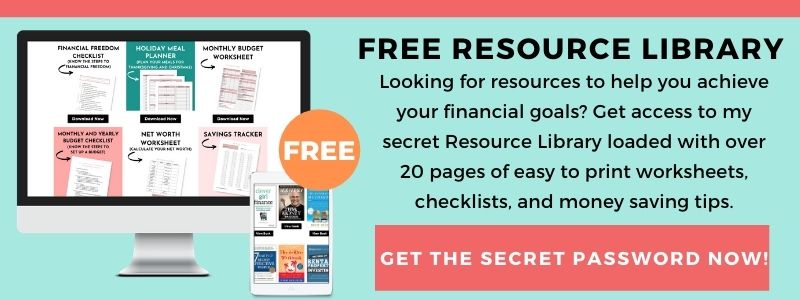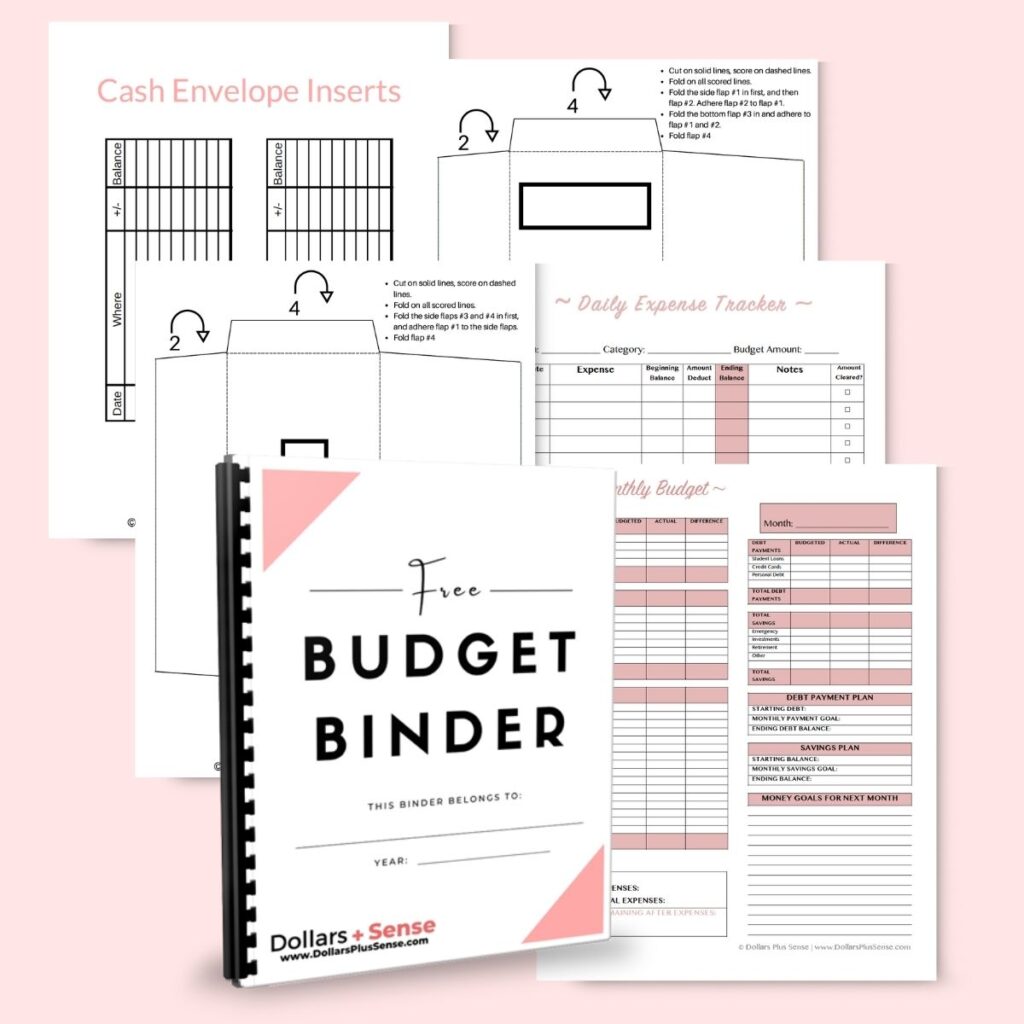Last Updated October 10, 2022
Are you having a hard time sticking to a budget? Or maybe you have a shopping addiction? You may not know this, but I LOVE to shop! I still do. When I first started my financial freedom journey, the hardest part for me was to control my impulse spending. It took me a while to control this urge. But in this article, I’m going to share with you how I quit my shopping addiction so sticking to a budget is much easier.
How I Quit My Shopping Addiction
I Changed My Money Mindset
Your money mindset is about how you feel about yourself and your life. Money is not just income coming in, and expenses out. Understand the “why” behind every transaction.
A lot of spending we do is very emotional. So I would take a second to ask myself “why do I want to purchase this?” Is it an emotional want, or is it a need? A lot of the time it was just an emotional want.
I would feel good at the time and even get a temporary high when I bought something new. But shortly after that, I was left feeling empty and unsatisfied with my purchases when I got home. I felt guilty knowing I had no business buying yet another item I did not need and couldn’t afford.
I had to change my money mindset and find other fulfilling things to do with my time and money. So instead of seeking status through material objects and approval from others, I had to become confident in myself. I stopped caring what other people thought about me…because, at the end of the day, they’re not paying my bills!
I also found other ways to be happy (like spending more quality time with family and friends), instead of using shopping as a way of trying to feel better about myself.
Wait To Make An Unplanned Purchase

I waited before I made any unplanned purchases. I recommend you wait at least 24 hours before making an unplanned purchase.
By waiting, it helps you get past the emotions. If it is a more expensive item, I recommend you wait 30 days before making that purchase. Use that time to do some research to look for cheaper prices online and/or to save money for the item.
I found this strategy to wait really helped me with my impulse purchases because it was like a “mind trick” for me. I wasn’t telling myself “no”…I was just telling myself “you can have that, but you just have to wait 24 hours before you buy it.” Since I wasn’t telling myself “no” I didn’t feel as deprived.
Nine times out of ten, I would forget about that item by the next day or was just too lazy to go back to the store for it. This method worked extremely well for me.
Calculate The TRUE Cost Of An Item
Another trick that worked well for me is I would calculate how much energy it took for me to purchase an item. Whenever I want to buy an item, I ask myself “is this item worth (X) amount of hours at work?” Most of the time, the answer was NO!
How To Calculate The TRUE Cost Of An Item:
If you want to use this trick, start by figuring out your TRUE hourly wage.
First, you have to determine your TRUE annual salary. The way you do that is you subtract your work related expenses (any cost you have specifically because of your job) from your take-home pay (after tax income).
- TRUE Annual Salary = Take Home Pay – Work Related Expenses
Some work related expenses include things such as: child care, commuter cost, work clothes, meals, gifts to coworkers, etc. So for example, if your annual take-home pay is $36,000, but you have $6,000 worth of work related expenses, your TRUE take-home salary is $30,000.

Now it’s time to calculate the TRUE number of hours you work in a year. The way you do that is you calculate the amount of time spent at work and any other activity you have to do in relation to your work.
- TRUE Number Of Hours Worked In A Year = Time Spent At Work + Any Other Activity You Have To Do In Relation To Work
For example, you can include the time:
- To travel to and from work,
- You spend dropping your child off at daycare,
- To get ready for work,
- You spend working outside of the office,
- To Shop for work clothes,
- Complete any business travel,
- For any business dinners or office parties, etc.
as part of your other activities you have to do in relation to work.
So for example, let’s say the other activities you have to do for work take you an additional 15 hours a week. Assuming your hours at work are 40 hours a week, your TRUE number of hours you work in a year is 2,860 (40+15=55 hours worked per week x 52 weeks in a year =2,860).
To calculate your TRUE hourly wage, you divide your TRUE take-home salary by your TRUE number of hours worked.
- TRUE Hourly Wage = TRUE Annual Salary/TRUE Number Of Hours Worked In A Year
In the example above your true hourly wage would be $10.49 ($30,000/2,860=10.49).
Now that you see you’re actually earning only $10.49 for each hour you work, when you go to buy a new item for $50, ask yourself “is this item worth working 5 hours for?” Considering how many hours you had to work to buy that item will really deter you from buying it.
Unsubscribe From Email Lists

I had to unsubscribe from the email list of some of my favorite stores. I didn’t even want to KNOW what sales they had going on, because it would make it too hard for me to resist.
Most of the time, I wasn’t even thinking about shopping, but with that amazing coupon that caught my attention, how can I not take a look around?? And BOOM…just like that, I’m at the checkout page.
So I recommend you unsubscribe from your favorite retailers too. Make sure to delete your credit card information from your computer browser as well to make checking out more difficult for you.
Also, I would only go to these websites if I know what I want to buy, and how much I’m going to spend beforehand. I try my best not to browse around and just purchase exactly what I need.
Make A Plan To Spend While Sticking To A Budget
If you want to be successful with sticking to a budget, you should give yourself a little “fun money” in your budget. This is money you can spend however you want and on what you want. I think this is actually very important and helped me a lot when it came to sticking to a budget. By doing this, I felt less deprived when it came to my budget.

It’s almost like when you’re starting a healthy eating plan. If you only eat salad all day, every day, you will eventually lose it and binge eat junk food. That’s why a lot of nutritionists recommend you have at least one “cheat meal” a week.
I think budgeting is very similar. You can’t just go cold turkey. Doing that will make you hate budgeting, and you wont stick with it very long. Just make sure the amount you allocate to “fun money” is reasonable and something you can afford in your budget.
Plan Out Your Shopping Trips
When I need to buy something, I try my best to plan out my shopping trips. I’m clear on the things I need and try to only buy that. I recommend bringing someone with you who doesn’t like to shop (like your husband) so that way you’re more inclined to get in and get out.
Finally, try to only spend cash. Bring only the amount of cash you think you will need for the item you need to buy. This will help you stick to your shopping plan and limit any impulse purchases.
Find Another Hobby

I used to shop out of sheer boredom or because it was just something to do. I would go to the mall “just to see what they had.” Don’t make shopping your hobby! Try to find something more productive to do with your time.
Consider volunteering, doing some other low-cost activity you enjoy, or working more hours at your job. If your schedule is filled, you will find you have no time (or you’re just too tired) to shop just for fun.
Keep Your Financial Goals In Mind
Finally, it was very useful for me to keep my financial goals in mind at all times when sticking to my budget. I had a goal of saving for a house, and I would tell myself “my house is more important than these shoes.”
So I recommend you make clear financial goals, and always keep them in your mind. What financial goals do you hope to accomplish? Always thinking about your savings goals will allow you to see how any unplanned purchases will set you back from achieving your financial goals.
Summary
I know it’s not easy controlling your impulse spending or getting rid of a shopping addiction. But with time and discipline, you can do it.
Start by changing your money mindset and don’t spend based off of your emotions. Next, wait to make an unplanned purchase and think about the TRUE cost of an item in terms of energy. Unsubscribe from email lists; but when you do plan to spend, make sure it’s accounted for in your budget.
Also, try to find low-cost hobbies to occupy your time and mind. Finally, always keep your financial goals in mind whenever tempted to spend. Follow these tips, and you will break your shopping addiction and sticking to a budget will become much easier!
Related Articles:
- Budget Organization Tools: The Ultimate Personal Finance Binder
- How To Create A Personal Finance Binder: Supplies List
- How I Use My Monthly and Yearly Household Budget Spreadsheet
If you want to remember this article, pin it to your favorite Pinterest board.






